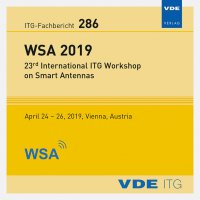Binary Multilevel Coding over Eisenstein Integers for MIMO Broadcast Transmission
Conference: WSA 2019 - 23rd International ITG Workshop on Smart Antennas
04/24/2019 - 04/26/2019 at Vienna, Austria
Proceedings: WSA 2019
Pages: 8Language: englishTyp: PDF
Personal VDE Members are entitled to a 10% discount on this title
Authors:
Stern, Sebastian; Fischer, Robert F. H. (Institute of Communications Engineering, Ulm University, Germany)
Rohweder, Daniel; Freudenberger, Juergen (Institute for System Dynamics, HTWG Konstanz, University of Applied Sciences, Germany)
Abstract:
It is well known that signal constellations which are based on a hexagonal grid, so-called Eisenstein constellations, exhibit a performance gain over conventional QAM ones. This benefit is realized by a packing and shaping gain of the Eisenstein (hexagonal) integers in comparison to the Gaussian (complex) integers. Such constellations are especially relevant in transmission schemes that utilize lattice structures, e.g., in MIMO communications. However, for coded modulation, the straightforward approach is to combine Eisenstein constellations with ternary channel codes. In this paper, a multilevel-coding approach is proposed where encoding and multistage decoding can directly be performed with state-of-the-art binary channel codes. An associated mapping and a binary set partitioning are derived. The performance of the proposed approach is contrasted to classical multilevel coding over QAM constellations. To this end, both the single-user AWGN scenario and the (multiuser) MIMO broadcast scenario using lattice-reduction-aided preequalization are considered. Results obtained from numerical simulations with LDPC codes complement the theoretical aspects.


